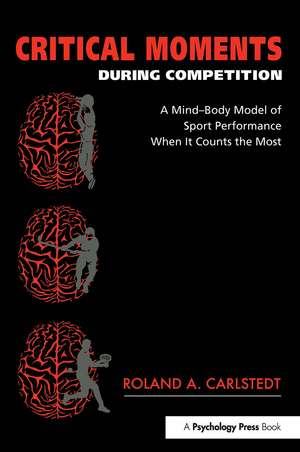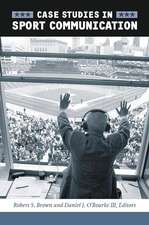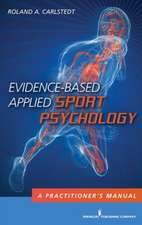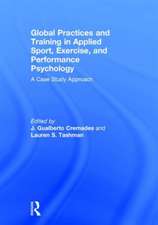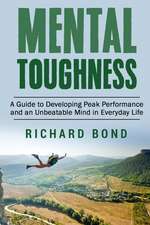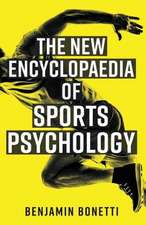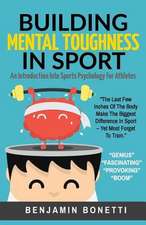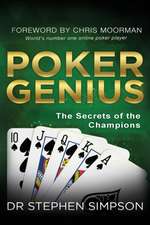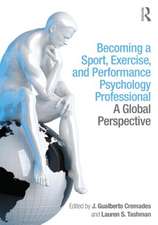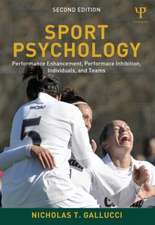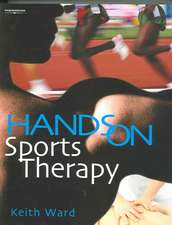Critical Moments During Competition: A Mind-Body Model of Sport Performance When It Counts the Most
Autor Roland A. Carlstedten Limba Engleză Paperback – 24 iul 2004
| Toate formatele și edițiile | Preț | Express |
|---|---|---|
| Paperback (1) | 298.13 lei 6-8 săpt. | |
| Taylor & Francis – 24 iul 2004 | 298.13 lei 6-8 săpt. | |
| Hardback (1) | 947.36 lei 6-8 săpt. | |
| Taylor & Francis – 25 iul 2004 | 947.36 lei 6-8 săpt. |
Preț: 298.13 lei
Preț vechi: 348.39 lei
-14% Nou
Puncte Express: 447
Preț estimativ în valută:
57.05€ • 59.72$ • 47.20£
57.05€ • 59.72$ • 47.20£
Carte tipărită la comandă
Livrare economică 05-19 aprilie
Preluare comenzi: 021 569.72.76
Specificații
ISBN-13: 9781841690940
ISBN-10: 1841690945
Pagini: 280
Dimensiuni: 152 x 229 x 18 mm
Greutate: 0.39 kg
Ediția:1
Editura: Taylor & Francis
Colecția Psychology Press
Locul publicării:Oxford, United Kingdom
ISBN-10: 1841690945
Pagini: 280
Dimensiuni: 152 x 229 x 18 mm
Greutate: 0.39 kg
Ediția:1
Editura: Taylor & Francis
Colecția Psychology Press
Locul publicării:Oxford, United Kingdom
Cuprins
Foreword by Stanley Krippner, Ph.D. Part 1. Theoretical Foundations. 1. Theoretical Foundations. 2. Critical Moments during Competition: The Theory of Critical Moments. 3. The High Risk Model of Threat Perception and Athletes. 4. Primary Higher Order Predictor Variables: Effects on Athletes and Performance. 5. Neuropsychophysiological Concomitants of Primary Higher Order Factors and the Athlete's Profile. Part 2. Emerging Evidence. 6. Emerging Evidence: Results from a Large Study of Athletes. 7. Emerging Evidence: Statistical and Empirical Implications. 8. Psychophysiological Concomitants of Primary Higher Order Factors and the Athlete's Profile: Heart Rate Variability and Heart Rate Deceleration Investigations. Part 3. Applied Sport Psychology: Assessing and Mastering Critical Moments. 9. Assessing Critical Moments. 10. Toward a Global Psychophysiological Marker of Psychological Performance and Critical Moments during Competition: Quantifying Zone or Flow States. 11. Assessing and Predicting Psychological Performance during Critical Moments on the Basis of Pychophysiological Stress Testing: A Case Study. 12. Mastering Critical Moments: The Carlstedt Protocol. 13. Applying the Carlstedt Protocol: A Case Study. 14. Active-Alert Hypnosis and the Carlstedt Protocol. 15. A Design for Implementing and Testing the Efficacy of a Biofeedback Protocol Created for a Fromer Wimbledon Champion: A Case Study. 16. An Internet-Based Athlete Assessment, Analysis, Intervention, and Database Center: Your Personal Sport Psychology Consultant.
Recenzii
"Roland A. Carlstedt's impressive book creatively integrates research from multiple subdisciplines in psychology to arrive at a highly original and coherent theory of peak sport performance. Readers will benefit from Dr. Carlstedt's experience as a professional athlete and coach as well as his solid academic credentials and training in the areas of cognitive neuroscience, psychophysiology, behavioral medicine, and personality. His eclectic background brings new insights, methods, and findings to the field of sport psychology that will have an impact for years to come." - Roger Drake, Ph.D., Keck School of Medicine of the University of Southern California and Western State College of Colorado; Cognitive Neuroscientist
"Why do some professional athletes tend to 'deliver' in critical situations, while others are less dependable? Dr. Carlstedt's Mind-Body Model of Sport Performance focuses on this well-known and vexing performance difference between comparably talented professional athletes. He traces these differences to certain basic personality characteristics and their interplay. Depending on their strength and configuration, these general personal propensities may play either a facilitative or counterproductive (but potentially modifiable) role. Carlstedt's model is obviously of great relevance to sport psychologists. Because of its plausibility as well as its amenability to empirical scrutiny and continuing development, it also merits the attention of a wider readership. It has the potential for evolving into a general model for understanding consistent excellence in response to challenge." - Auke Tellegen, Emeritus Professor of Psychology, University of Minnesota, USA
"R. Carlstedt brings a thoroughly innovative perspective to the field of sport psychology in this new book. His model of peak performance ambitiously and successfully integrates a wealth of physiological, psychological, and cognitive neuroscience data to forcefully make the case that athletic performance cannot only be studied in a controlled fashion, but can be improved systematically. Although scholarly in its methodologies, this book is highly readable, and will be of interest to a wide range of academics, coaches, athletes, and mental health and sport psychology professionals." - Sanjay Mathew, M.D., Columbia University College of Physicians and Surgeons, Department of Psychiatry; Psychiatrist, neuroscientist, and former ranked tennis player
"This book provides a timely model for an evidence-based approach to assessment and retraining peak performance in athletes, particularly during critical moments of competition. Importantly, it points the way forward to bridge the gap between anecdote and testable brain science in this field." - Dr. Evian Gordon, founding director, Brain Dynamics Centre, Westmead Hospital, Sydney, Australia; CEO, The Brain Resource Company, developer of the world's first standardized International Database on the Human Brain; lead author and editor of Integrative Neuroscience
"Why do some professional athletes tend to 'deliver' in critical situations, while others are less dependable? Dr. Carlstedt's Mind-Body Model of Sport Performance focuses on this well-known and vexing performance difference between comparably talented professional athletes. He traces these differences to certain basic personality characteristics and their interplay. Depending on their strength and configuration, these general personal propensities may play either a facilitative or counterproductive (but potentially modifiable) role. Carlstedt's model is obviously of great relevance to sport psychologists. Because of its plausibility as well as its amenability to empirical scrutiny and continuing development, it also merits the attention of a wider readership. It has the potential for evolving into a general model for understanding consistent excellence in response to challenge." - Auke Tellegen, Emeritus Professor of Psychology, University of Minnesota, USA
"R. Carlstedt brings a thoroughly innovative perspective to the field of sport psychology in this new book. His model of peak performance ambitiously and successfully integrates a wealth of physiological, psychological, and cognitive neuroscience data to forcefully make the case that athletic performance cannot only be studied in a controlled fashion, but can be improved systematically. Although scholarly in its methodologies, this book is highly readable, and will be of interest to a wide range of academics, coaches, athletes, and mental health and sport psychology professionals." - Sanjay Mathew, M.D., Columbia University College of Physicians and Surgeons, Department of Psychiatry; Psychiatrist, neuroscientist, and former ranked tennis player
"This book provides a timely model for an evidence-based approach to assessment and retraining peak performance in athletes, particularly during critical moments of competition. Importantly, it points the way forward to bridge the gap between anecdote and testable brain science in this field." - Dr. Evian Gordon, founding director, Brain Dynamics Centre, Westmead Hospital, Sydney, Australia; CEO, The Brain Resource Company, developer of the world's first standardized International Database on the Human Brain; lead author and editor of Integrative Neuroscience
